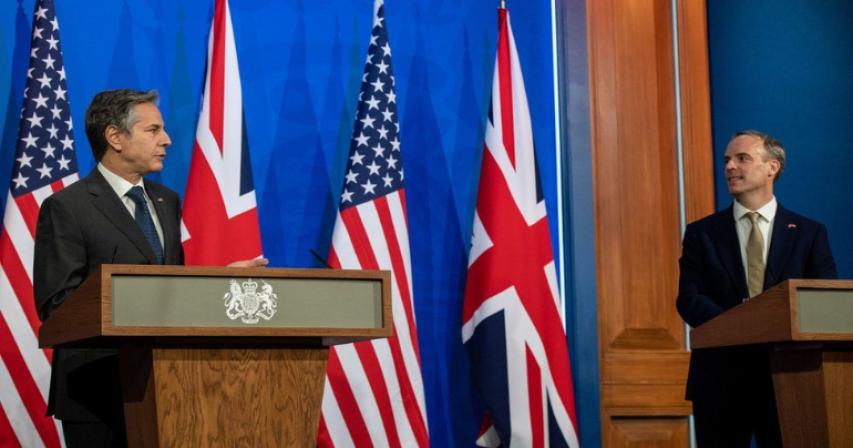G7 - Foreign ministers to discuss rising threats at London summit
- 4 years ago

Foreign ministers from the world's leading economies are meeting in London for their first face-to-face talks in more than two years.
The G7 are expected to discuss new ways for the group to defend international rules from external threats.
UK Foreign Secretary Dominic Raab will lead discussions on the crisis in Myanmar, as well as relations with Russia, China and Iran.
He said it was a chance to tackle "shared challenges and rising threats".
The G7 group - the world's seven largest so-called advanced economies - is made up of the UK, Canada, France, Germany, Italy, Japan and the United States.
Australia, India, South Korea and South Africa have also been invited as guests to the three-day summit, as the UK tries to deepen ties with the Indo-Pacific region.
Mr Raab, wearing a face mask, welcomed counterparts at Lancaster House in London, with forearm bumps replacing the usual handshakes.
The UK, which holds the rotating presidency of the G7, will host a summit of leaders in Cornwall next month.
On Monday, Mr Raab met US Secretary of State Antony Blinken, who is making his first visit to London since being appointed by US President Joe Biden.
At a joint UK-US press conference following the talks, the UK foreign secretary said there was a shift towards "likeminded countries" working more closely together in the face of hostile states like Russia and China.
He said London and Washington stood "shoulder to shoulder" on issues such as these, while Mr Blinken said the US had "no closer ally, no closer partner" than the UK.
The summit comes amid criticism over the UK's decision to cut overseas aid spending from 0.7% of national income to 0.5% - a reduction of more than £4bn.
Asked about the aid cuts, Mr Raab said it had been a "difficult decision" but that the UK still had scope "to be an even greater force for good in the world".
Talks between the G7 will be held throughout the day on Tuesday, while the foreign ministers will attend a dinner with the guest nations in the evening.
Lancaster House in central London has played host to many historic negotiations, but rarely will it have seen such diplomatic speed dating as it will later.
For the next few days, foreign ministers will scurry round the clock from meeting to meeting, doing as much business face to face as they can after months of virtual diplomacy.
They will discuss the world's big geopolitical issues: from China to Myanmar, Ethiopia to Ukraine, Syria to the Sahel.
The underlying theme will be how they can best organise to defend international rules and open societies against the threat of autocratic regimes.
And for the UK, the meeting's host, it's a big test to see if its global foreign policy can live up to its name.
Mr Raab said: "The UK's presidency of the G7 is an opportunity to bring together open, democratic societies and demonstrate unity at a time when it is much needed to tackle shared challenges and rising threats.
"The addition of our friends from Australia, India, the Republic of Korea and South Africa, as well as the chair of Asean reflects the growing significance of the Indo Pacific region for the G7."
Regular testing, size limits and other measures have been used to prevent the spread of Covid-19 during the discussions.
On Monday it was announced that the G7 would use the summit to commit to investing $15bn (£10.8bn) to help women in developing countries.
They are also expected to agree a new target of sending 40 million more girls from low- and middle-income countries to school within five years.
Source: BBC
Comments